

NIGMS Grantees Receive National STEM Mentoring Award
In a previous post, we highlighted two NIGMS-funded winners of the 2018 Presidential Award for Excellence in Science, Mathematics and Engineering Mentoring (PAESMEM  ). For January’s National Mentoring Month, we tell you about other awardees: J.K. Haynes, Virginia Shepherd, and Maria da Graça H. Vicente.
). For January’s National Mentoring Month, we tell you about other awardees: J.K. Haynes, Virginia Shepherd, and Maria da Graça H. Vicente.
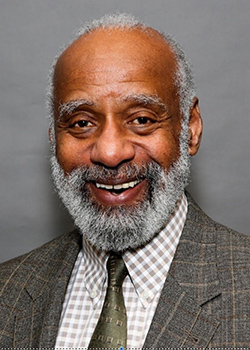
J. K. Haynes, Ph.D., Morehouse College. Credit: Morehouse College.
During his long scientific career, J. K. Haynes has been a successful researcher and served in prestigious administrative and national leadership positions. But he is most proud of the individual lives he has impacted. Teaching and mentoring are his passions.
During his four decades at Morehouse College—the nation’s only private, historically black, liberal arts college for men—Haynes has influenced the lives of more than 3,000 African American undergraduates. He inspired many of these young men to pursue graduate degrees in STEM  fields. He has also mentored many junior faculty and others at Morehouse.
fields. He has also mentored many junior faculty and others at Morehouse.
Key to Haynes’s mentorship philosophy is instilling a sense of professionalism, integrity, compassion, and competence. To empower mentees to overcome obstacles, he helps them develop a healthy outlook on uncertainty and rejection. He also emphasizes interdisciplinary studies and intercultural experiences, and the importance of networking and embracing new ideas.
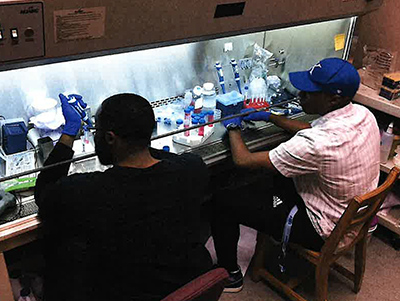
Morehouse students at work in the research laboratory of Dr. Jeffrey Handy, assistant professor of biology at Morehouse and one of Dr. Haynes’ mentees. Credit: Morehouse College.
During his time at Morehouse, Haynes served as director of the Office of Health Professions, director of the honors program, chair of the department of biology, dean of the division of science and mathematics, and faculty member of the NIGMS-supported Institutional Research and Academic Career Development Awards (IRACDA) collaboration between Emory University and Morehouse. He has also served on advisory committees and as a board member  for several national and government science organizations.
for several national and government science organizations.
In 2015, Haynes received a Champion of Change at HBCUs Award from the Whitehouse. His biography is included in the 1996 book Distinguished African American Scientists of the 20th Century, and an interview with him  is included in the History Makers Digital Oral Archive (2011).
is included in the History Makers Digital Oral Archive (2011).
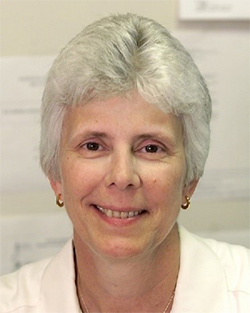
Virginia Shepherd, Ph.D., Vanderbilt University. Credit: Vanderbilt University.
For more than 25 years, Virginia Shepherd has championed science and math education in public schools. Her interest in this area was initially sparked by a talk she attended in 1992, in which scientists were encouraged to spend 4 hours per week in a K–12 science classroom. Since that time, she has continued to seek new ways of improving STEM  education in schools and promoting professional development for K–12 science teachers.
education in schools and promoting professional development for K–12 science teachers.
A professor emerita of education at Vanderbilt’s Peabody College, Shepherd founded and directed the university’s Center for Science Outreach (CSO),  which connects scientists with the K–12 community, both locally in Nashville, Tennessee, and nationally. The CSO’s School for Science and Math at Vanderbilt (SSMV),
which connects scientists with the K–12 community, both locally in Nashville, Tennessee, and nationally. The CSO’s School for Science and Math at Vanderbilt (SSMV),  funded in part by the Science Education Partnership Award, is a joint venture between Vanderbilt and Metropolitan Nashville Public Schools. Twenty-six students from each high school class year participate in a 4-year, research-centered experience 1 day per week on the Vanderbilt campus. They start with classroom instruction from professors and progress to completing individual research projects. Similarly, the Day of Discovery program provides middle school students with an immersive, research-based STEM curriculum 1 day per week at a magnet high school. Among SSMV students, 86 percent have gone on to college to major in a STEM field or graduate with a STEM major. Fifty-five percent of SSMV students are female.
funded in part by the Science Education Partnership Award, is a joint venture between Vanderbilt and Metropolitan Nashville Public Schools. Twenty-six students from each high school class year participate in a 4-year, research-centered experience 1 day per week on the Vanderbilt campus. They start with classroom instruction from professors and progress to completing individual research projects. Similarly, the Day of Discovery program provides middle school students with an immersive, research-based STEM curriculum 1 day per week at a magnet high school. Among SSMV students, 86 percent have gone on to college to major in a STEM field or graduate with a STEM major. Fifty-five percent of SSMV students are female.
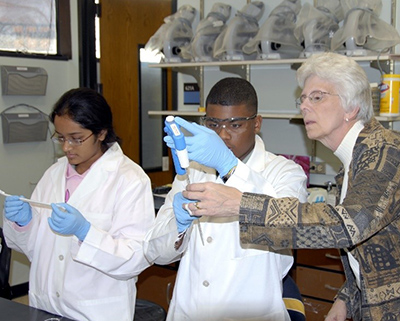
Shepherd looks over the shoulder of a student participating in the School for Science and Math at Vanderbilt. Credit: Vanderbilt University.
Shepherd also started the Scientist in the Classroom  program, now in its 19th year. The program is a collaboration between Nashville’s public schools and five local higher-learning institutions, including Vanderbilt. It creates partnerships between science teaching fellows (STFs) and public-school science teachers in elementary and middle schools. The STFs, about 40 percent of whom represent underrepresented populations are graduate or post-graduate students who work with teachers to develop hands-on, inquiry-based activities and provide classroom demonstrations. The STFs also help tutor students and direct student research projects. About 10 percent of the STFs have gone on to become K–12 teachers. The program benefits some 130 graduate and undergraduate students, 110 K–12 teachers, and more than 10,000 K–12 students.
program, now in its 19th year. The program is a collaboration between Nashville’s public schools and five local higher-learning institutions, including Vanderbilt. It creates partnerships between science teaching fellows (STFs) and public-school science teachers in elementary and middle schools. The STFs, about 40 percent of whom represent underrepresented populations are graduate or post-graduate students who work with teachers to develop hands-on, inquiry-based activities and provide classroom demonstrations. The STFs also help tutor students and direct student research projects. About 10 percent of the STFs have gone on to become K–12 teachers. The program benefits some 130 graduate and undergraduate students, 110 K–12 teachers, and more than 10,000 K–12 students.
Along with her Presidential Award, Shepherd has received many accolades related to her dedication to promoting STEM education, including the Mayor’s Award for Outstanding Partner in 2011 and the Mary Jane Werthan award for contributions to the advancement of women in 2008.
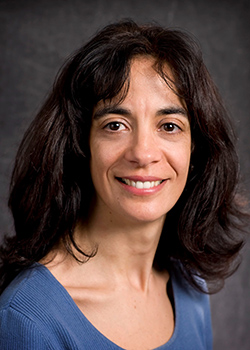
Maria da Graça H. Vicente, Ph.D., Louisiana State University. Credit: LSU IMSD.
Maria da Graça H. Vicente  is both a distinguished professor of chemistry and an influential scientific mentor. Dozens of her mentees now hold scientific leadership positions in universities, government, and industry. Vicente’s impact is especially strong among students from groups that are underrepresented in STEM
is both a distinguished professor of chemistry and an influential scientific mentor. Dozens of her mentees now hold scientific leadership positions in universities, government, and industry. Vicente’s impact is especially strong among students from groups that are underrepresented in STEM  disciplines.
disciplines.
Since 2007, Vicente has directed the Initiative for Maximizing Student Development (IMSD) at Louisiana State University (LSU).  This NIGMS-supported program provides research training and career development to graduate students across the country. Its long-term goal is to produce a diverse pool of well-trained biomedical scientists.
This NIGMS-supported program provides research training and career development to graduate students across the country. Its long-term goal is to produce a diverse pool of well-trained biomedical scientists.
As director of LSU’s IMSD program, Vicente and her staff arrange meaningful research experiences, training activities, educational mentoring plans, and networking opportunities for participating students. She believes that keys to the success of the program include providing students with resources to explore career options, access to a strong network of collaborations, and support for making critical career and personal decisions.
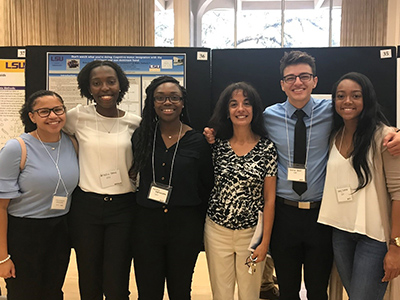
Dr. Vicente with IMSD scholars (from the left: Paris Taylor, Briasha Jones, Ashley Merriweather, Dr. Vicente, Tanner Reed, Amy Turner) at the LSU 2018 Summer Undergraduate Research Forum. Credit: LSU IMSD.
Under Vicente’s leadership, LSU’s IMSD program expanded the university’s outreach to underrepresented students. The program also increased student retention and graduation rates and boosted students’ competitiveness for entering the next phase of their educational and professional lives. In part due to her efforts, more African Americans receive doctorate degrees in chemistry from LSU than from anywhere else in the nation. The program even strengthened LSU’s faculty publication record and competitiveness for research awards.
Along with her Presidential Award, Vicente has received numerous other teaching and mentoring awards. 





















.png)












No hay comentarios:
Publicar un comentario